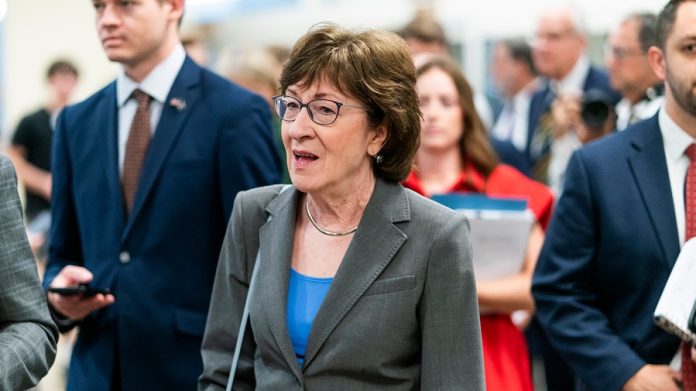
Wagner College, a small, private liberal arts college on Staten Island in New York has agreed to comply with the Trump administration’s restrictions on transgender student-athletes following a federal investigation that stemmed from an incident at a women’s fencing competition in March, the Education Department announced Friday.
The department’s Office for Civil Rights (OCR) launched an investigation into Wagner after USA Fencing officials disqualified a woman from a tournament at the University of Maryland on March 30. Stephanie Turner, 31, had refused to compete against Red Sullivan, a 19-year-old Wagner student, taking a knee to protest Sullivan’s participation in violation of the competition’s rules.
A video of Turner’s disqualification quickly went viral, amplified by conservative activists, political figures and Fox News.
“This is heroic on her part,” Rep. Mike Lee (R-Utah) wrote in a post on social platform X, responding to a video of the exchange posted by Riley Gaines, a frequent critic of transgender women in women’s sports.
In May, the House Oversight Subcommittee on Delivering on Government Efficiency held a hearing on the incident and invited Turner to testify.
Participation in the University of Maryland’s Cherry Blossom Open, hosted annually during springtime, is not limited to college students, according to the school’s fencing club, of which Turner, who now lives in suburban Philadelphia, is a former member.
Sullivan, a sophomore at Wagner, entered the competition individually. She had competed for the college’s women’s fencing team until February, when the NCAA said it would comply with President Trump’s executive order to ban transgender student-athletes from girls’ and women’s sports.
In an interview with Rolling Stone in April, Sullivan said the exchange with Turner left her bewildered. “Nothing close to this has ever happened. No one has ever had a problem with me fencing in a women’s event,” said Sullivan, who became medically eligible for women’s tournaments last year.
USA Fencing, the sport’s governing body, announced in July that it would amend its transgender and nonbinary participation policy to align with a new U.S. Olympic and Paralympic Committee policy barring transgender women from competing in Olympic women’s sports.
As part of its deal with the Trump administration, Wagner will formally amend its athletic policies to reflect “biology-based” definitions of the words “male” and “female,” consistent with an executive order Trump signed on his first day back in office proclaiming that the U.S. recognizes only two unchangeable sexes.
The college will also issue a public statement pledging to comply with Title IX, the federal civil rights law against sex discrimination in schools that the Trump administration has said prohibits transgender students from competing in girls’ and women’s sports.
The University of Pennsylvania, Trump’s alma mater, agreed to a nearly identical resolution in July.
In a statement on Friday, Wagner College President Jeffrey Doggett said the school would continue to foster a welcoming and supportive community but that it has a responsibility to comply with federal laws as the government interprets them. He apologized to any student-athletes who were negatively impacted by the school allowing transgender women to compete.
The college’s agreement with the administration, Doggett said, is “markedly different” from those of other universities found to have violated Trump’s orders.
“Working cooperatively with the OCR investigators, we were able to negotiate terms that are limited, minimally intrusive and tailored to the particular facts of Wagner’s situation,” he said.
Doggett added that the college had been following NCAA and USA Fencing rules applicable at the time when it allowed Sullivan, whom the statement does not name directly, to participate on the women’s fencing team. The agreement with the OCR “makes clear that there was no admission or finding of any wrongdoing by the College,” he said.
“As we know, higher education is in the midst of great change,” Doggett continued. “Like many institutions, Wagner College is doing what it must to advance its mission during this period of turbulence. I believe that it is of the utmost importance that Wagner set a course that ensures its long-term success, and part of that is to continue to foster an open and supportive community that follows the laws and regulations with which it must comply. In bringing an end to this investigation I believe we can continue to do both.”











